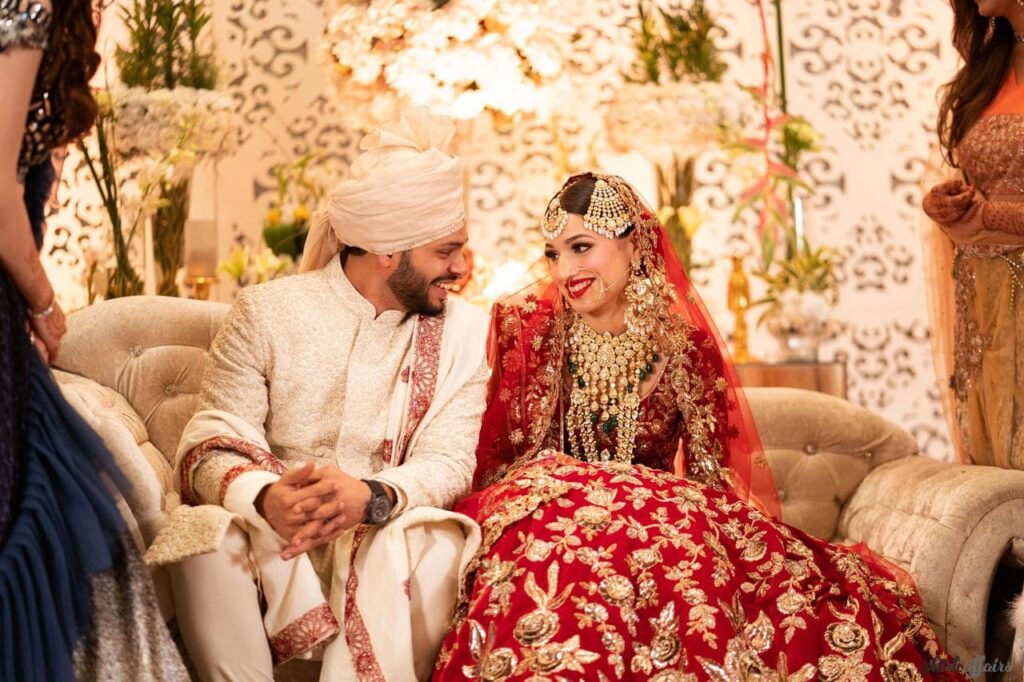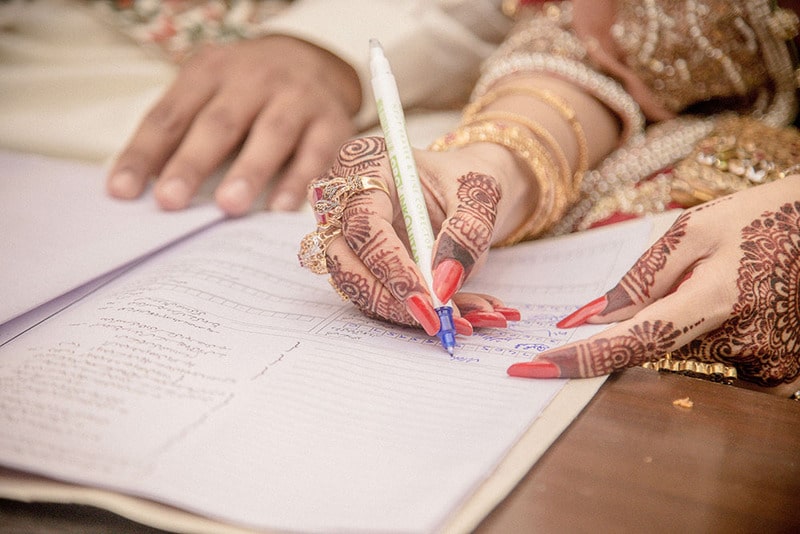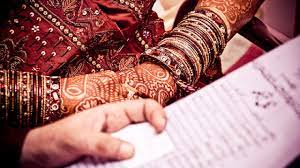Nikah Marriage in Court
e-marriages websites are online platforms that offer the opportunity for couples to get married through an online nikah court process. These websites provide a convenient and efficient way for couples to legally marry without having to physically attend a court or travel to their respective countries for the purpose of marriage.
Nikah marriage in court
Nikah is an Islamic marriage contract that is based on the teachings of Islam and is recognized as a valid and legal form of marriage in Islamic countries. In some countries, a Nikah marriage can be registered in court to provide legal protection and recognition to the marriage.
The process of registering a Nikah marriage in court may vary depending on the country and the specific requirements of the court. Typically, the couple must provide proof of identity, such as a passport or national ID card, and provide witnesses who can testify to the authenticity of the marriage.
Once the marriage is registered in court, it becomes a legally recognized marriage under the law of the land. This means that the couple will have legal rights and responsibilities, such as the right to inherit each other’s property and the obligation to support each other financially.
It is important to note that the requirements for registering a Nikah marriage in court may vary depending on the country and the specific legal system in place. In some cases, the court may require additional documentation or evidence to verify the validity of the marriage.
Overall, a Nikah marriage in court can provide legal protection and recognition to the marriage, while also ensuring that the couple’s rights and responsibilities are legally recognized under the law
Requirement Nikah marriage in court
The requirements for registering a Nikah marriage in court can vary depending on the country and the specific legal system in place. However, in general, there are some common requirements that need to be met.
- Age: The legal age for marriage varies from country to country, but in most cases, both parties must be of legal age or have the required consent from their legal guardians.
- Consent: Both parties must freely and willingly consent to the marriage. This means that they must not be under any pressure, coercion, or duress to enter into the marriage.
- Witnesses: In most cases, two adult witnesses who are of sound mind and can testify to the authenticity of the marriage must be present.
- Identity Proof: Both parties must provide proof of identity, such as a passport or national ID card, to verify their identity.
- Mahr: The groom must provide a Mahr (dowry) to the bride as a sign of commitment and support.
- Marriage Contract: The marriage contract or Nikahnama must be signed by both parties, the witnesses, and the officiant or the religious leader who performed the ceremony.
- Registration: After the marriage ceremony, the Nikahnama needs to be registered in court to provide legal recognition and protection to the marriage.
It is important to note that the requirements for a Nikah marriage in court may vary depending on the country and the specific legal system in place. It is advisable to consult with a lawyer or a legal expert to understand the specific requirements and procedures in your country
Process of Nikah marriage in court
The process of registering a Nikah marriage in court can vary depending on the country and the specific legal system in place. However, in general, the following are the steps involved in the process:
- Preparation: The couple needs to prepare for the Nikah ceremony by choosing an officiant, selecting witnesses, and deciding on the Mahr or dowry.
- Nikah Ceremony: The Nikah ceremony is performed by an officiant or a religious leader, who recites the necessary prayers and verses and asks for the consent of the bride and groom.
- Marriage Contract: After the ceremony, the marriage contract or Nikahnama is signed by both parties, the witnesses, and the officiant.
- Submission of Documents: The couple needs to submit the required documents, including proof of identity, the Nikahnama, and other necessary paperwork to the court.
- Verification: The court will verify the authenticity of the marriage and check if all the legal requirements are met.
- Registration: Once the court is satisfied with the verification process, the Nikah marriage is registered, and the couple is issued a marriage certificate.
It is important to note that the process of registering a Nikah marriage in court may vary depending on the country and the specific legal system in place. It is advisable to consult with a lawyer or a legal expert to understand the specific requirements and procedures in your country.


Why Choose e marriage For a nikah Court Marriage
- Convenience: E-marriage allows the couple to complete the Nikah registration process online from the comfort of their own home or office. This can save time and effort that would otherwise be spent on travel and waiting in queues.
- Accessibility: E-marriage makes the Nikah registration process accessible to people who may not have easy access to a court or registry office. This can be especially beneficial for couples who live in remote areas or who have mobility issues.
- Security: E-marriage platforms typically use secure servers and encryption technologies to protect the personal and confidential information of the couples. This can provide a high level of security for the couple’s personal data and financial transactions.
- Transparency: E-marriage platforms often provide a transparent process for Nikah registration, with clear guidelines and requirements for the registration process. This can help to reduce the chances of errors or misunderstandings during the registration process.
- Cost-effective: E-marriage can be a cost-effective option, as it eliminates the need for travel, and often offers lower fees compared to traditional court or registry office registration processes.
Overall, choosing e-marriage for a Nikah court marriage can provide a convenient, accessible, secure, transparent, and cost-effective option for couples who want to register their marriage. However, it’s important to do research and choose a reliable and trustworthy e-marriage platform to ensure a smooth and hassle-free process.
Nikah marriages in court include:
- Nikah Contract: The Nikah contract is a legal document that outlines the terms and conditions of the marriage, including the rights and responsibilities of both parties. The contract is signed by both parties, the witnesses, and the officiant or religious leader who performed the ceremony.
- Mahr: Mahr is a mandatory gift or dowry that the groom is required to give to the bride at the time of marriage. The amount of Mahr can be agreed upon by both parties beforehand or can be decided by the court.
- Witnesses: Two adult witnesses who are of sound mind and can testify to the authenticity of the marriage must be present during the Nikah ceremony and the registration process.
- Officiant: An officiant or religious leader performs the Nikah ceremony and witnesses the signing of the Nikah contract. The officiant also helps in registering the Nikah marriage in court.
- Registration: The Nikah marriage needs to be registered in court to provide legal recognition and protection to the marriage. The registration process includes submitting the required documents, verification, and the issuance of a marriage certificate.
- Legal Requirements: The Nikah marriage in court needs to meet certain legal requirements, including the age of the parties involved, the consent of both parties, and the absence of any coercion or duress.
Overall, the Nikah marriage in court involves several main titles, including the Nikah contract, Mahr, witnesses, officiant, registration, and legal requirements. It is important to understand and fulfill these requirements to ensure a legally recognized and protected marriage
Nikah Contract in court
A Nikah contract is a legal document that outlines the terms and conditions of a Muslim marriage, including the rights and responsibilities of both the bride and the groom. It is an essential part of the Nikah marriage in court, and it is signed by both parties, the witnesses, and the officiant or religious leader who performed the ceremony.
The Nikah contract typically includes the following provisions:
- Identity: The contract should include the full names and identification details of both parties, including their date of birth, nationality, and place of residence.
- Mahr: The Mahr or dowry is a mandatory gift or payment that the groom is required to give to the bride at the time of the marriage. The amount of Mahr can be agreed upon by both parties beforehand or can be decided by the court.
- Rights and Responsibilities: The Nikah contract outlines the rights and responsibilities of both the bride and the groom, including their duties towards each other, their children, and their families.
- Divorce: The contract may include provisions regarding divorce, such as the right of the wife to seek a divorce, the conditions for divorce, and the financial arrangements in case of divorce.
- Arbitration: The contract may also include a provision for arbitration in case of disputes between the parties.
- Witnesses: The Nikah contract requires the presence of two adult witnesses who are of sound mind and can testify to the authenticity of the marriage.
The Nikah contract is a legally binding document and forms the basis of the Nikah marriage in court. It serves as a means of protecting the rights of both parties and ensuring a fair and just marriage. It is important for both parties to carefully read and understand the terms of the contract before signing it to avoid any misunderstandings or disputes later on.


Mahr in court
Mahr is a mandatory gift or payment that the groom is required to give to the bride at the time of the Nikah marriage in court. It is an essential part of the Nikah contract and serves as a means of providing financial security and protection to the bride.
The amount of Mahr can be agreed upon by both parties beforehand or can be decided by the court. The Mahr can be paid in cash or kind, such as jewelry or property, and is typically given to the bride at the time of the marriage.
The Mahr serves several purposes in the Nikah marriage in court, including:
- Financial Protection: The Mahr provides financial protection to the bride in case of divorce or death of the husband. It ensures that the bride has a financial cushion to fall back on in case of any unforeseen circumstances.
- Dignity and Respect: The Mahr is a symbol of the husband’s commitment to the marriage and his willingness to provide for his wife. It also serves as a means of showing respect and dignity towards the bride.
- Legal Requirement: The Mahr is a legal requirement in Islam, and the absence of Mahr can render the marriage invalid.
The Mahr is an important aspect of the Nikah marriage in court and is considered to be the bride’s rightful entitlement. It is important for both parties to understand and agree upon the terms of the Mahr before the marriage to avoid any disputes or misunderstandings later on.
Witnesses in niakh for court marriges
In a Nikah marriage in court, witnesses play a crucial role in ensuring the authenticity and validity of the marriage. Two adult witnesses who are of sound mind and can testify to the legality and authenticity of the marriage must be present during the Nikah ceremony and the registration process.
The role of witnesses in a Nikah marriage in court includes:
- Verifying Identity: The witnesses must verify the identity of both parties before the marriage ceremony takes place. They must ensure that both the bride and the groom are of legal age and have provided the required identification documents.
- Confirming Consent: The witnesses must ensure that both parties are entering into the marriage willingly and without any coercion or duress. They must confirm that both parties have provided their full and informed consent.
- Testifying to the Ceremony: The witnesses must be present during the Nikah ceremony and must testify to the legality and authenticity of the marriage. They must sign the Nikah contract along with the bride and the groom, and the officiant or religious leader who performed the ceremony.
- Registration Process: The witnesses must also be present during the registration process of the Nikah marriage in court. They must verify the identity of both parties and sign the registration documents.
The role of witnesses in a Nikah marriage in court is crucial in ensuring that the marriage is legally recognized and protected. Witnesses play a key role in verifying the identity of the parties